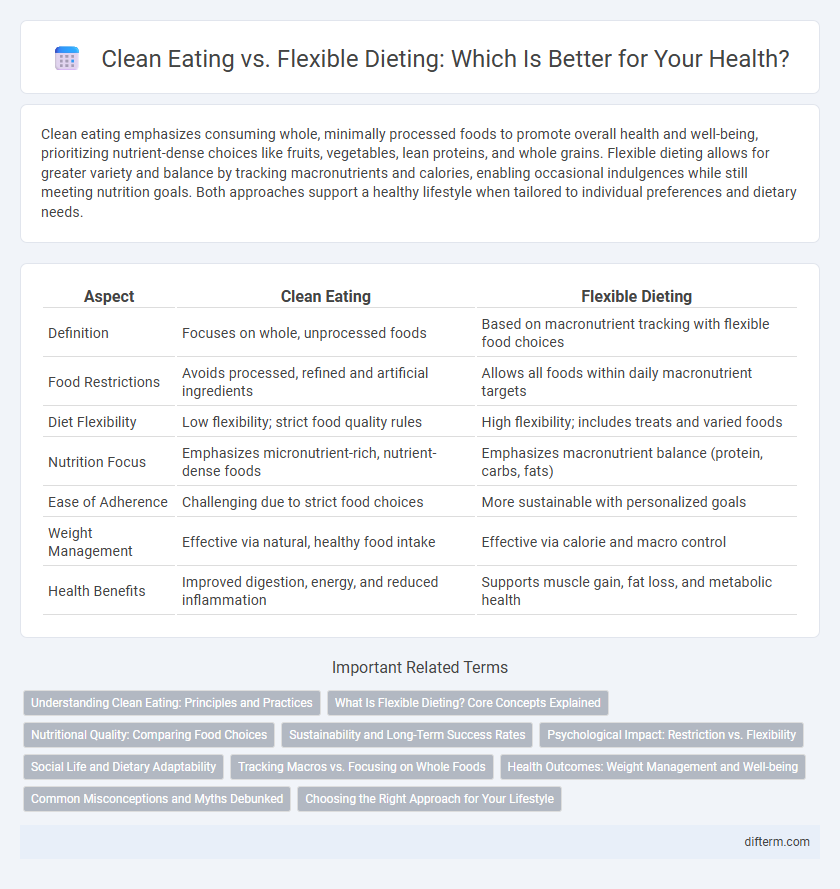Clean eating emphasizes consuming whole, minimally processed foods to promote overall health and well-being, prioritizing nutrient-dense choices like fruits, vegetables, lean proteins, and whole grains. Flexible dieting allows for greater variety and balance by tracking macronutrients and calories, enabling occasional indulgences while still meeting nutrition goals. Both approaches support a healthy lifestyle when tailored to individual preferences and dietary needs.
Table of Comparison
| Aspect | Clean Eating | Flexible Dieting |
|---|---|---|
| Definition | Focuses on whole, unprocessed foods | Based on macronutrient tracking with flexible food choices |
| Food Restrictions | Avoids processed, refined and artificial ingredients | Allows all foods within daily macronutrient targets |
| Diet Flexibility | Low flexibility; strict food quality rules | High flexibility; includes treats and varied foods |
| Nutrition Focus | Emphasizes micronutrient-rich, nutrient-dense foods | Emphasizes macronutrient balance (protein, carbs, fats) |
| Ease of Adherence | Challenging due to strict food choices | More sustainable with personalized goals |
| Weight Management | Effective via natural, healthy food intake | Effective via calorie and macro control |
| Health Benefits | Improved digestion, energy, and reduced inflammation | Supports muscle gain, fat loss, and metabolic health |
Understanding Clean Eating: Principles and Practices
Clean eating emphasizes consuming whole, minimally processed foods such as fruits, vegetables, lean proteins, and whole grains to maximize nutrient intake and support overall health. This approach prioritizes natural ingredients, avoiding additives, artificial sweeteners, and refined sugars, promoting better digestion and sustained energy levels. Practicing clean eating involves mindful food choices and preparation methods that preserve nutritional quality, aligning with wellness goals and reducing the risk of chronic diseases.
What Is Flexible Dieting? Core Concepts Explained
Flexible dieting centers on tracking macronutrient intake--proteins, fats, and carbohydrates--rather than restricting specific foods, allowing a more adaptable approach to nutrition. This method empowers individuals to enjoy a variety of foods while meeting daily nutrient targets, promoting sustainability and long-term adherence. Studies show flexible dieting can improve body composition and metabolic health by balancing caloric intake with physical activity.
Nutritional Quality: Comparing Food Choices
Clean eating emphasizes whole, minimally processed foods rich in vitamins, minerals, and fiber, promoting optimal nutrient density for overall health. Flexible dieting allows a broader range of food choices based on macronutrient targets, which can include processed items with lower micronutrient content. Prioritizing nutritional quality in food choices ensures better vitamin and mineral intake, improved digestion, and sustained energy levels regardless of diet style.
Sustainability and Long-Term Success Rates
Clean eating emphasizes whole, minimally processed foods, promoting nutrient density and long-term health by reducing exposure to additives and excess sugars. Flexible dieting allows for the inclusion of a wider variety of foods within macronutrient targets, which increases adherence by reducing dietary restrictions and supporting personalized preferences. Studies show flexible dieting often results in higher sustainability and long-term weight management success due to improved compliance and psychological flexibility.
Psychological Impact: Restriction vs. Flexibility
Clean eating often emphasizes strict avoidance of processed foods, which can lead to feelings of restriction and increased psychological stress, potentially triggering unhealthy eating behaviors. Flexible dieting promotes a balanced approach by allowing occasional indulgences, reducing guilt and enhancing long-term adherence through a more positive relationship with food. Psychological research highlights that flexibility in diet fosters sustainable habits and improves mental well-being compared to rigid clean eating rules.
Social Life and Dietary Adaptability
Clean eating emphasizes whole, unprocessed foods, often making social dining challenging due to strict ingredient scrutiny and limited restaurant options. Flexible dieting allows for varied food choices and easier social interactions by accommodating occasional treats and diverse cuisines without compromising overall nutritional goals. This adaptability supports long-term adherence and social engagement while maintaining diet quality.
Tracking Macros vs. Focusing on Whole Foods
Tracking macros allows precise control over nutrient intake, enabling flexible dieting to adapt to various food choices while meeting specific goals. Clean eating emphasizes whole, minimally processed foods, promoting nutrient density and long-term health benefits through natural ingredients. Balancing macro tracking with whole food focus can optimize diet quality and sustainability for improved health outcomes.
Health Outcomes: Weight Management and Well-being
Clean eating emphasizes whole, minimally processed foods that support steady energy levels and improved nutrient intake, which can lead to sustained weight management and enhanced overall well-being. Flexible dieting allows for more dietary variety by tracking macronutrients rather than food types, promoting adherence and preventing feelings of deprivation that often contribute to long-term success in weight control. Both approaches can positively impact health outcomes when personalized to individual needs and combined with regular physical activity.
Common Misconceptions and Myths Debunked
Clean eating and flexible dieting often face misconceptions that clean eating is rigid and overly restrictive, while flexible dieting encourages unhealthy food choices; however, clean eating emphasizes whole, nutrient-dense foods without banning specific groups, and flexible dieting prioritizes macronutrient balance to support individual goals. Another myth is that flexible dieting leads to poor nutrition, but it can be tailored to include nutrient-rich options, ensuring well-rounded dietary intake. Both approaches promote sustainable health when personalized and balanced according to scientific dietary guidelines.
Choosing the Right Approach for Your Lifestyle
Clean eating emphasizes whole, unprocessed foods rich in nutrients, promoting long-term health benefits through natural ingredients, while flexible dieting allows more variety by tracking macronutrients to fit personal preferences and social occasions. Both approaches can support weight management and improved energy, but selecting the right method depends on individual lifestyle factors such as meal planning time, food tolerance, and nutritional goals. Tailoring the diet to maintain consistency and satisfaction increases the likelihood of sustainable healthy habits.
clean eating vs flexible dieting Infographic

 difterm.com
difterm.com